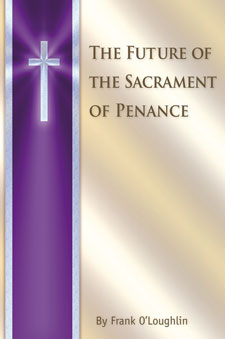In recent decades, much of what Protestants always thought Roman Catholicism was about has all but vanished.
Mass is no longer said in Latin; saints are seldom invoked in prayer; and, as we learn from this book, The Future of the Sacrament of Penance, the habit of private confession of sin to a parish priest has declined sharply.
Author Father O'Loughlin tries to put these developments into context, and suggests a theological framework for preserving the essence of "penance' " the term Catholics use to describe the interaction between the church and the repentant sinner " into the future.
 Belying its title, most of the book is in fact spent discussing the history of penance.
Belying its title, most of the book is in fact spent discussing the history of penance.
O'Loughlin tells us that it was in response to the practice " at the time considered merciful " of allowing a baptised Christian to be reconciled after serious fault once, and once only, that many Christians " for instance the Emperor Constantine " took to delaying baptism until their death beds.
In medieval times, Irish monks developed a "tariff' of temporal punishments for confessed sin. Apparently serious Christians thought it appropriate to hire others to perform the penalties which were imposed. O'Loughlin notes that however much "we might smile" at such practices today, history might judge our age's response to sin as merely culturally conditioned.
Private confession, it seems, was an innovation of the Counter-Reformation of the late sixteenth century. At first, like mass attendance itself, it was required only annually, then subsequently on major feast days, and latterly weekly, as with mass itself. So arose one of the most distinctive features of Roman Catholic devotion.
O'Loughlin attributes the decline of confession to the disappearance of sectarian distinctiveness, that is, Catholics being more like other Christians. He also acknowledges post-modernism's assault on moral absolutes.
But O'Loughlin reassures his readers that this is not the end of the sacrament itself, but merely of a 400-year-old expression of it. Penance has taken many forms in the past, and new forms will have to be developed to meet the needs of contemporary Catholics.
It is at this point that Evangelical Christians will most regret the absence of any attempt on the author's part to exegete scripture.
There is no suggestion that the post-modernist trends he has reviewed should be examined in the light of scripture and there is no citing of the epistles to review apostolic forms of church discipline.
And yet, the author firmly insists that penance should be performed in the context of the proclamation of scripture. Scripture should be read, he says, not in order to discern the mind of God, but as a "catalyst" by which God invites us into His perspective and "enters into dialogue" with the believer.
This is much truth in this of course, but O'Loughlin seems to think the only alternative method of interpreting scripture is the fundamentalist conception of its human authors as no more than "telephone lines" from God. He appears unaware of the evangelical understanding that neither the human authorship nor divine inspiration of scripture need diminish or detract from the other.
By means of this dialogue, O'Loughlin suggests that penance may, like the Eucharist, evolve as one of the means by which Christians memorialise what scripture chiefly proclaims: the death and resurrection of Christ. Whether this would amount to an adequate understanding of God's grace is something which the reader should perhaps determine after reading his argument.
It is unfortunate that the author ignores the penitential practices of other Christian traditions. There is no mention of the customs of the Churches of the Reformation. The Anglican reader would never know, for instance, that what O'Loughlin refers to as the "Third Rite' of the 1973 Rite of Penance, is something which has appeared in every version of the Book of Common Prayer " the General Confession.
Astonishingly, it seems the Roman Catholic hierarchy has in recent years withdrawn permission for its clergy to permit congregations to engage in communal public, instead of private, confession.
That this noteworthy fact is neither defended nor attacked, but simply regretted, is itself an interesting commentary on the unspoken limits within which O'Loughlin writes.
The lack of either biblical exegesis or mention of Christian traditions, other than Rome's, limits the usefulness of this book for Anglicans.
However, anyone who is interested in the history of church discipline before the Reformation and in how contemporary Roman Catholics are responding to the decline of a once distinctive and powerful devotional custom, will find this book an interesting and not at all heavy-going companion.




















